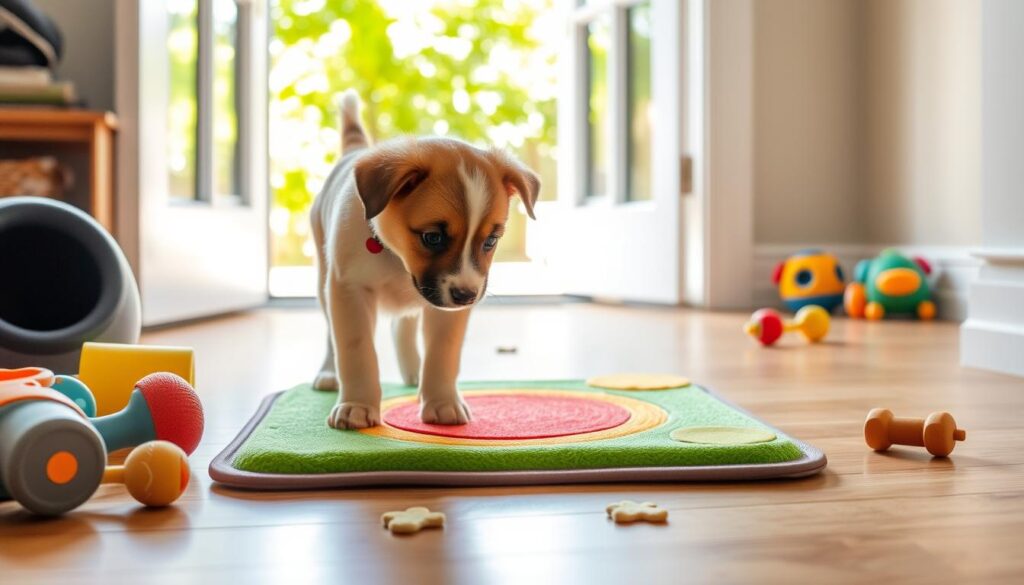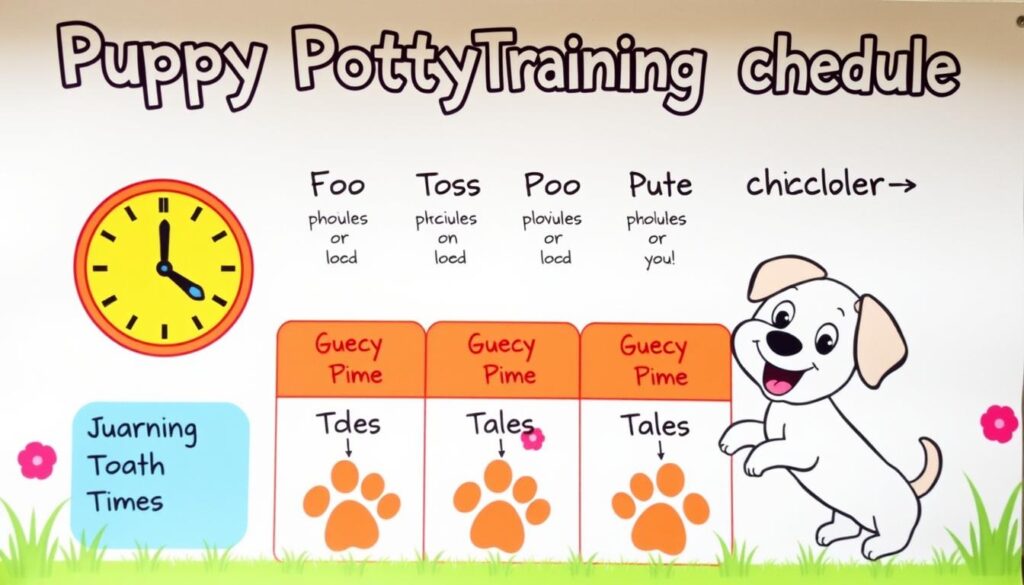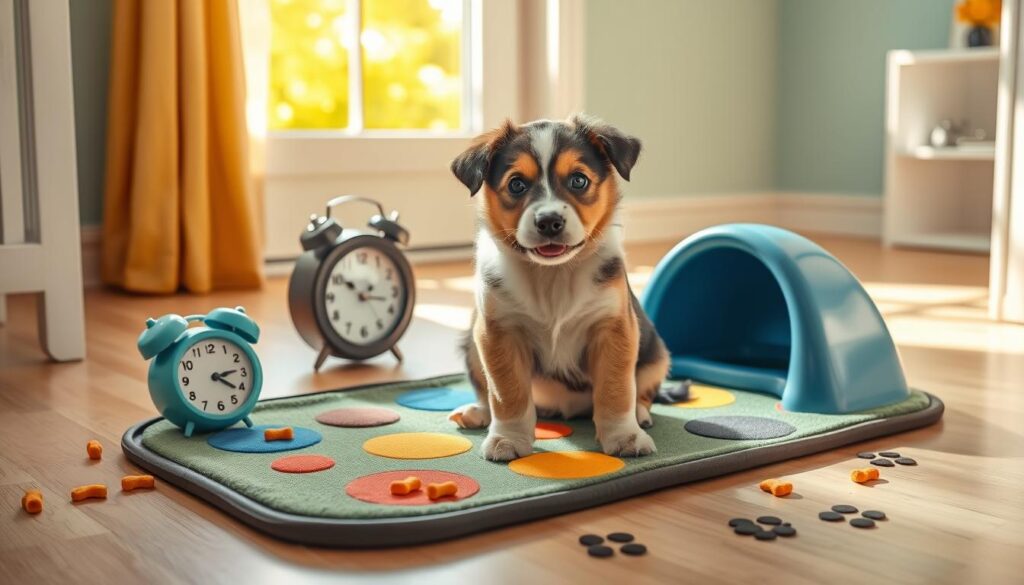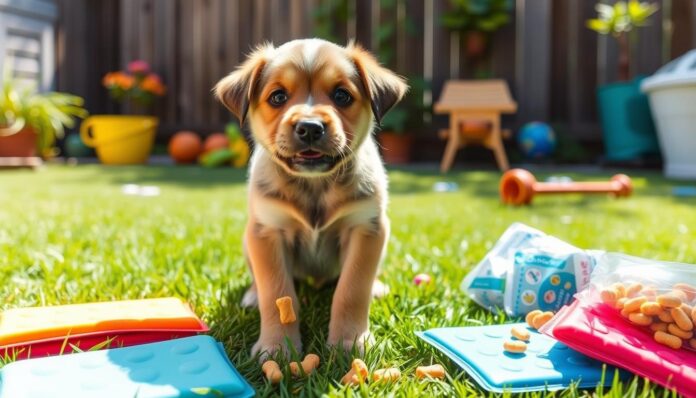As a new puppy parent, I remember the excitement and challenges of potty training. The thought of messes and accidents was daunting. But, I learned that with the right approach, it could be smooth and rewarding.
Proper potty training is key for new puppy owners. House soiling is a top reason dogs lose their homes or end up in shelters. Effective potty training can prevent this and lead to a happy life together. This article will share easy tips and proven techniques for potty training your puppy.
Key Takeaways
- Potty training is a critical first step for new puppy owners to prevent house soiling and ensure a long, happy life together.
- This article provides easy-to-follow tips and proven techniques to make potty training your puppy a smooth process.
- Proper potty training can prevent puppies from ending up in shelters due to house soiling issues.
- Effective potty training leads to a stronger bond and more enjoyable experience with your new furry friend.
- Following a structured approach, using positive reinforcement, and understanding your puppy’s needs are key to successful potty training.
The Importance of Potty Training Your Puppy
Potty training is key to raising a well-behaved puppy. Dogs naturally keep their living space clean. Without training, they might soil the house, damaging floors and causing frustration.
Starting a puppy potty training schedule early is vital. It prevents accidents and sets your puppy up for success.
Puppies can learn to use the bathroom in a few months. But, they usually stay with their mother until they are eight weeks old. This means you have a short time to start house training a puppy quickly.
Professional dog trainers can help with housebreaking, even for older dogs. Training your puppy early can prevent messes and destruction. Puppies with a routine are less likely to have accidents.
“Positive reinforcement during potty training can create a positive association between going potty outside and receiving treats, petting, and positive words.”
Some puppies have smaller bladders, making training slower. But, positive reinforcement can make going outside rewarding. Dogs thrive on routine, so start early to prevent accidents.
Creating a routine with your dog strengthens your bond. Professional pet care can also help with potty training. Remember, patience is essential when training a puppy.
Potty Training Tips for Puppies
Training your puppy to use the potty can be both rewarding and challenging. The right techniques can help your puppy succeed. Consider using crates and introducing puppy pads or paper training.
Using Crates for Potty Training
Crate training is a great way to potty train puppies. Dogs don’t like to soil their sleeping area. This makes the crate a useful tool.
But, it’s important to use crates correctly. Don’t keep your puppy in the crate for too long, except at night. Puppies have small bladders and can’t hold it for hours. Make sure the crate is the right size for your puppy. It should let them comfortably lay down, sit, stand, and turn around.
Puppy Pads and Paper Training
Puppy pads and paper training are good for small breed puppies or busy owners. But, use them carefully to avoid accidents. Move the pad closer to the door each day until it’s where you want it.
Remember, patience, consistency, and watching your puppy are key. Reward them when they go potty outside. Stick to a regular schedule to prevent accidents. Keeping track of your puppy’s potty habits helps with training.

With the right approach, you can avoid common puppy potty training mistakes. Stay patient, consistent, and attentive. You’ll soon have a clean, happy home.
Establishing a Housetraining Schedule
Potty training your puppy needs consistency and a good schedule. Puppies can only hold their urine for as long as they are months old plus one. For example, a 2-month-old puppy can hold it for about 3 hours.
Take your puppy out often, at least every 2 hours. Do it right after meals, naps, and playtime. This helps them learn where to go.
Keeping a regular feeding schedule is key for housetraining. Most puppies eat three to four meals a day. A consistent mealtime routine helps predict when they need to go outside.
- Puppies need a potty break every 4 hours. They might need more during high-energy times.
- A 3-month-old puppy can stay in a crate for up to 4 hours without accidents. They might need nighttime outings until they are 5 months old.
- Plan meals, walks, playtime, and activities in a daily routine. This helps with puppy potty training schedule success.
Being consistent and patient is essential for puppy potty training schedule success. A structured routine and frequent trips outside will teach your puppy quickly. Remember, it can take 8-12 weeks of consistent training before they’re ready for more freedom.

“Puppies need constant supervision initially for successful house training. It’s important to take them out frequently and reward them when they go in the right place.”
Potty Training Tips for Puppies: Easy Guide
Potty training your puppy is a key part of being a responsible pet owner. It might seem hard at first, but with patience and consistency, you can do it. Here are some expert tips to help:
First, set up a regular potty schedule. Puppies under 12 weeks need to go out every one to two hours. Feed them three times a day to help with their potty schedule.
- Take your puppy out in the morning, after meals, after play, and before bed.
- Give treats and praise right away when they go in the right spot.
- Don’t scold your puppy for accidents. It can make things harder.
Crate training is also helpful. Puppies can hold their urine for an hour more than their age in months. A right-sized crate teaches them to wait until they’re let out.
Some dogs and breeds are easier to train than others. But with the right care and consistency, most puppies can learn in seven to 14 days.
| Potty Training Tip | Benefit |
|---|---|
| Establish a consistent schedule | Helps puppies learn when and where to go |
| Use positive reinforcement | Encourages desired behavior and builds trust |
| Crate train your puppy | Teaches them to hold it until let out of the crate |
| Clean up accidents thoroughly | Removes odors that may attract repeat soiling |
By using these potty training tips for puppies, you can teach your puppy good habits. A clean, happy home awaits. Remember, being consistent and patient is key for successful how to potty train a puppy.

Conclusion
Potty training a puppy takes time and effort, but it can be easier with the right methods. A consistent schedule, crate training, and rewarding good behavior are key. These steps help house training a puppy quickly and successfully.
Remember, every puppy learns at their own pace. Be patient and follow the right approach. This way, you can potty train puppies fast and enjoy a well-behaved pet.
Consistency in routines, rewards, and cues is very important for potty training. Start early and avoid common mistakes like rushing or not rewarding good behavior. This will help your puppy learn faster.
With the right mindset and techniques, you can make potty training easier. This will lay a strong foundation for your puppy’s future.
Potty training needs patience and a commitment to your puppy’s growth. Follow the guidelines in this article and seek help if needed. This will make potty training smooth and effective for you and your pet.

